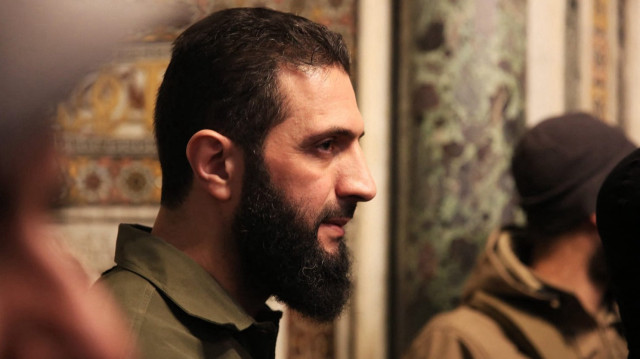
Barbara Leaf, top US diplomat for Middle East, says she had 'good' and 'thorough' discussion with HTS leader Ahmed al-Sharaa
The US on Friday said it will no longer be pursuing the $10 million “Rewards for Justice” bounty on the Hayat Tahrir al-Sham (HTS) leader Ahmed al-Sharaa, also known as Abu Mohammad al-Jolani.
"I told him (HTS leader Ahmed al-Sharaa) we would not be pursuing the Rewards for Justice reward offer that has been in effect for some years," Barbara Leaf, the US assistant secretary of state for Near Eastern affairs, told reporters following her meeting with HTS officials in Damascus.
In her talk with al-Sharaa, Leaf said she had a "good" and "thorough" discussion on a range of regional issues as well as the domestic scene.
"I heard him on his priorities, which are very much rooted in getting Syria on the road to economic recovery," she continued.
She characterized her discussion with the HTS leader as "very productive," "detailed," and rearranged over a wide set of issues, adding that al-Jolani came across as "pragmatic."
"We've been hearing this for some time, some very pragmatic and moderate statements on various issues, from women's rights to protection to equal rights for all communities," she said.
"It was a good first meeting. We will judge by deeds, not just by words," she added.
Emphasizing the "critical need to ensure terrorist groups cannot pose a threat inside of Syria or externally," she said the HTS leader has expressed a commitment to this as well.
The meeting marks the first meeting between US officials and HTS members days after Bashar Assad, Syria's leader for nearly 25 years, fled to Russia after anti-regime groups took control of Damascus on Dec. 8, ending the Baath Party regime, which had been in power since 1963.
The takeover came after HTS fighters captured key cities in a lightning offensive that lasted less than two weeks.
HTS has been designated as a terrorist organization by the US, UK, UN, and Türkiye. However, the group and its leader have sought to rebrand themselves as a more moderate force in Syria, emphasizing inclusion and a political path forward.
According to several reports, the US, along with the UN and several other countries, is considering removing HTS from the terror list, though the officials have yet to confirm it officially.
- Türkiye's role
In response to a question, Leaf said Türkiye has a "sizable influence" historically, and "it's a neighboring state, and it has national security interests and all sorts of other interests."
"What our government would like to see is a Syria that can stand on its own two feet, that can regain, like its neighbor, Iraq, a full measure of sovereignty over its own affairs and with neighbors being both constructive in their engagements with Syria and also the Syrian government over time being equally constructive in its engagements and Syria no longer being a source of insecurity, instability, you know, drug trafficking, and so forth," she added.
On tensions in northeast Syria, Leaf said there has been a cease-fire in Manbij province.
The US is "energetically" engaged in discussions with Turkish authorities and the YPG-led Syrian Democratic Forces (SDF), she said, referring to the YPG, the Syrian branch of the PKK, which has been designated a terrorist organization by both the US and Türkiye.
"We think the best way ahead is for a cease-fire around Kobani and that we engage to find what I would call a managed transition in terms of SDF's role in that part of the country," she added.
On the reconstruction of Syria, she said it will require careful consideration, particularly regarding compliance with the Caesar Act, which mandates progress in areas the Assad regime has consistently ignored.

